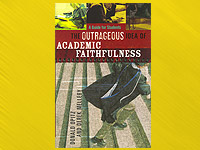The Outrageous Idea of Academic Faithfulness: A Guide for Students (Donald Opitz and Derek Melleby,2007)

It was a common view among the Christians who attended this prestigious Ivy League college that one should get “B”s for Christ. Striving for an “A” was considered to be a mark of academic idolatry and a failure to put first things first. The notion is fraught with problems in spite of its apparent patina of piety. It undermines the validity of striving for academic excellence – doing one’s best in everything. It undermines the validity of a student’s calling to be a student. It undermines the importance of the mind and beliefs in the process of spiritual formation. Ivy League students are generally smart to start with. But this view disconnects a passion for studies with a passion for Jesus. It takes a half-truth – academics can be idolatry and grade grubbing can be a neurotic obsession – and turns it into a self-serving religious justification for academic sloth. Half-truths are a lie with a marketing campaign.
More and more high school seniors are going to college. Fewer and fewer have any idea why. Authors Donald Opitz and Derek Melleby write, “If you don’t know why you’re attending college there is a good chance that you will struggle and eventually lose your way.” And many are, following blithely in the footsteps of Tom Wolfe’s Charlotte Simmons. It is rarely the books and classes that undermine Christian students’ faith – few take them that seriously – rather it is the pervasive ethic of fun, pleasure, and apathy. Nonbelieving students party and hook up. Christian students play the game more moderately, but according to the same rules. Fun and relationships not ideas and calling pervade campus life.
There was a required freshman course at my college that was designed to undermine the faith of casual Christians. Students who registered for classes on the first day sporting “Young Life” T-shirts were often sleeping with their girlfriends by the end of the first semester. A number of Christian students decided to do something about it. We created with the help of some seminary professors and our Inter-Varsity campus staff worker a parallel syllabus, which we put on reserve in the library. We held study groups, promising students good grades if they participated. We were determined to double study, to out think the ideas and issues being raised in this class. Bit by bit it made a difference. Christians gained a reputation for academic seriousness. One day out of the blue, a notorious campus playboy and fellow philosophy major called me up wanting to discuss Christ. I thought he was just playing games with me. But he was serious. His routine of alcohol and sex had run its inevitable course.
Opitz and Melleby have written a book that is long overdue. Here is a plea for students to take their academic pursuits as part of their faithfulness to Christ. It is the practical sequel to Steve Garber’s The Fabric of Faithfulness. The book provides a map of what it means “to take every thought captive to Christ” – in their own words, a “fitness campaign for the Christian mind.” It is a book that pastors, youth leaders, and parents should place in the hands of every starting college freshman. I’m sending a copy to my nephew. The next step is getting them to actually read it. If they do, they will be exposed to a vision of college life beyond their wildest dreams.

